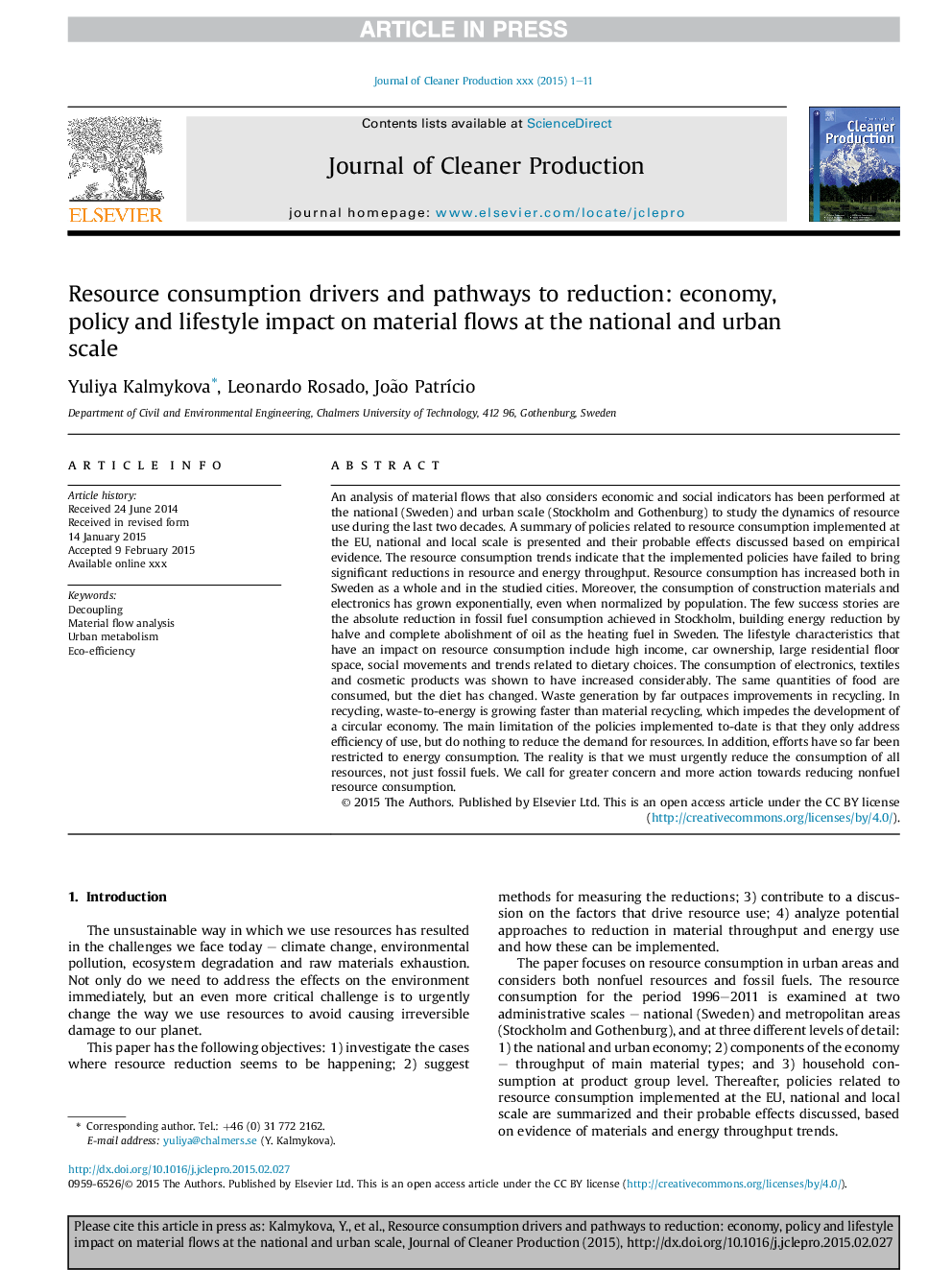| کد مقاله | کد نشریه | سال انتشار | مقاله انگلیسی | نسخه تمام متن |
|---|---|---|---|---|
| 8101454 | 1522117 | 2016 | 11 صفحه PDF | دانلود رایگان |
عنوان انگلیسی مقاله ISI
Resource consumption drivers and pathways to reduction: economy, policy and lifestyle impact on material flows at the national and urban scale
ترجمه فارسی عنوان
رانندگان مصرف منابع و راه های کاهش: اقتصاد، سیاست و شیوه زندگی بر جریان های مواد در مقیاس ملی و شهری
دانلود مقاله + سفارش ترجمه
دانلود مقاله ISI انگلیسی
رایگان برای ایرانیان
کلمات کلیدی
جدا کردن، تجزیه و تحلیل جریان جریان، متابولیسم شهری، بهره وری اقتصادی،
ترجمه چکیده
تجزیه و تحلیل جریانهای مادی که شاخص های اقتصادی و اجتماعی را نیز در نظر گرفته اند، در مقیاس ملی (سوئد) و شهری (استکهلم و گوتنبورگ) برای مطالعه پویایی استفاده از منابع در طی دو دهه گذشته انجام شده است. خلاصه ای از سیاست های مربوط به مصرف منابع اجرا شده در اتحادیه اروپا، ملی و محلی ارائه شده است و اثرات احتمالی آنها بر اساس شواهد تجربی مورد بحث قرار گرفته است. روند مصرف منابع نشان می دهد که سیاست های پیاده سازی شده به کاهش قابل توجهی در میزان مصرف منابع و انرژی منجر شده است. مصرف منابع در سراسر سوئد و در شهرهای مورد مطالعه افزایش یافته است. افزون بر این، مصرف مصالح ساختمانی و الکترونیک به صورت غیرمستقیم رشد کرده است، حتی زمانی که به صورت جمعیتی عادی شده است. چندین داستان موفق، کاهش مطلوب مصرف سوخت فسیلی در استکهلم است، کاهش انرژی را به نصف کاهش می دهد و نفت را به عنوان سوخت گرمایی در سوئد کاهش می دهد. ویژگی های شیوه زندگی که بر مصرف منابع تأثیر می گذارند شامل درآمد بالا، مالکیت خودرو، فضای بزرگ مسکونی، جنبش های اجتماعی و روند مربوط به انتخاب رژیم غذایی است. مصرف الکترونیک، پارچه و محصولات آرایشی به میزان قابل توجهی افزایش یافته است. همان مقدار غذا مصرف می شود، اما رژیم غذایی تغییر کرده است. نسل های زباله به مراتب فراتر از پیشرفت در بازیافت هستند. در بازیافت، زباله به انرژی سریعتر از بازیافت مواد در حال رشد است، که مانع توسعه یک اقتصاد مدور می شود. محدودیت اصلی سیاست هایی که تا به امروز اجرا می شود این است که آنها تنها به کارایی استفاده می پردازند، اما تقاضای منابع را کاهش نمی دهند. علاوه بر این تلاش ها تا کنون به مصرف انرژی محدود شده است. واقعیت این است که ما باید فورا مصرف تمام منابع را کاهش دهیم، نه فقط سوختهای فسیلی. ما از نگرانی بیشتر و اقدام بیشتر برای کاهش مصرف منابع غیر سوختی خواستاریم.
موضوعات مرتبط
مهندسی و علوم پایه
مهندسی انرژی
انرژی های تجدید پذیر، توسعه پایدار و محیط زیست
چکیده انگلیسی
An analysis of material flows that also considers economic and social indicators has been performed at the national (Sweden) and urban scale (Stockholm and Gothenburg) to study the dynamics of resource use during the last two decades. A summary of policies related to resource consumption implemented at the EU, national and local scale is presented and their probable effects discussed based on empirical evidence. The resource consumption trends indicate that the implemented policies have failed to bring significant reductions in resource and energy throughput. Resource consumption has increased both in Sweden as a whole and in the studied cities. Moreover, the consumption of construction materials and electronics has grown exponentially, even when normalized by population. The few success stories are the absolute reduction in fossil fuel consumption achieved in Stockholm, building energy reduction by halve and complete abolishment of oil as the heating fuel in Sweden. The lifestyle characteristics that have an impact on resource consumption include high income, car ownership, large residential floor space, social movements and trends related to dietary choices. The consumption of electronics, textiles and cosmetic products was shown to have increased considerably. The same quantities of food are consumed, but the diet has changed. Waste generation by far outpaces improvements in recycling. In recycling, waste-to-energy is growing faster than material recycling, which impedes the development of a circular economy. The main limitation of the policies implemented to-date is that they only address efficiency of use, but do nothing to reduce the demand for resources. In addition, efforts have so far been restricted to energy consumption. The reality is that we must urgently reduce the consumption of all resources, not just fossil fuels. We call for greater concern and more action towards reducing nonfuel resource consumption.
ناشر
Database: Elsevier - ScienceDirect (ساینس دایرکت)
Journal: Journal of Cleaner Production - Volume 132, 20 September 2016, Pages 70-80
Journal: Journal of Cleaner Production - Volume 132, 20 September 2016, Pages 70-80
نویسندگان
Yuliya Kalmykova, Leonardo Rosado, João PatrÃcio,
